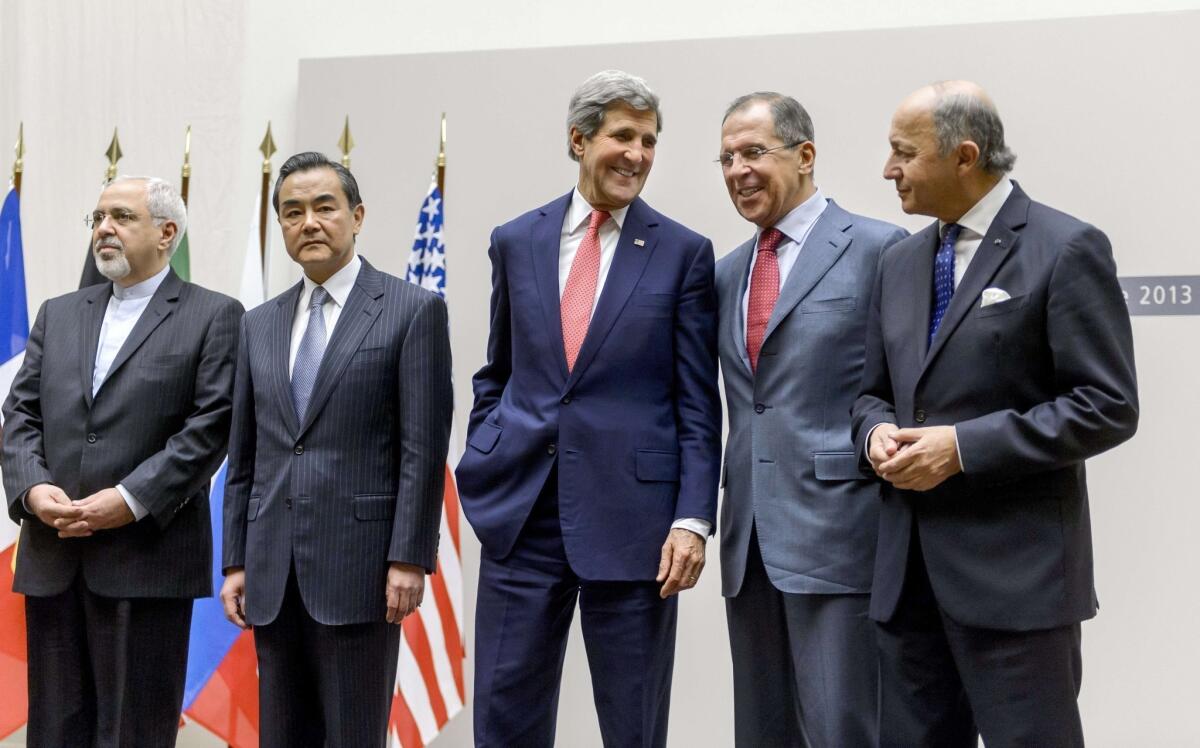Iran sanctions: Dancing with Tehran

- Share via
If economic sanctions were key to forcing Iran to accept limits on its nuclear program, wouldn’t more sanctions have an even greater effect?
Critics of last week’s interim nuclear deal with Tehran certainly think so.
It didn’t take long for them to denounce the agreement. “This is a bad deal — a very, very bad deal,” said Israeli Prime Minister Benjamin Netanyahu. “A surrender,” agreed former presidential candidate Newt Gingrich — “the Munich of the Middle East.”
In the view of the Obama administration as well as the naysayers, the effectiveness of sanctions brought Iran to the table. So why not double down on the punitive approach instead of settling for an interim six-month deal that allows Iran to continue enriching uranium as long as it stays within negotiated limits?
The deal between Iran and six world powers also reduces Tehran’s stockpile of highly enriched uranium, puts a ceiling on its store of low-enriched uranium and makes it harder for Iran to build a nuclear weapon without being detected.
But what the critics wanted was an agreement that stripped Iran of all its nuclear technology — immediately. If Iran wouldn’t agree, they argued, then stricter sanctions should be imposed until it did.
Here’s what’s wrong with that logic: As a practical matter, more sanctions aren’t available.
The sanctions the United States and its allies have clamped on Iran’s economy over the last decade have been among the most effective in history. Iran’s oil exports have been cut by almost two-thirds since 2011, its currency has plummeted and inflation has soared to an estimated 50%.
But the sanctions have worked, in large part, because they’ve been almost universally supported. Countries enforcing the measures have included not only the United States, the European Union and China but also important trading nations that aren’t in the negotiations, such as Japan and South Korea.
Sanctions imposed by just one country are rarely effective in forcing a rogue regime to change course. Just look at Cuba, which has been under a U.S. trade embargo for 53 years.
But sanctions with broad participation around the world can work, as they have in Iran.
The problem for the United States is that its ability to impose multilateral sanctions is limited by what its allies are willing to do. That has little to do with the decline of American power, real or imagined; it was true in the Cold War too. (Once again, see Cuba.)
In this case, Obama administration officials and foreign diplomats say, other countries aren’t willing to impose new sanctions on Iran when a deal they consider reasonable appears within reach. That’s true not only of China and Russia, which have historically been unenthusiastic about sanctions, but Britain and others as well.
“We wouldn’t be able to hold everyone together if we didn’t take this deal,” one U.S. official said. “The sanctions would start to fray.”
In the critics’ view, the very act of loosening a few sanctions could cause all of them to fray. The interim deal struck last weekend, they note, will allow Iran to recoup about $7 billion, mostly from oil earnings, over the next six months. And once that kind of easing happens, the critics say, it will be like pulling a string; the whole ball could begin to unravel.
Obama administration officials insist that won’t happen. They say they’ll be vigilant in patrolling the sanctions that remain; “we won’t turn a blind eye to anything,” one said.
Indeed, officials say they are relying on the remaining sanctions, which will deprive Iran of more than $30 billion in oil revenue during the same six months, to keep the Tehran government interested in a long-term agreement with tighter limits on its nuclear program.
“At the end of six months, the sanctions will still be there,” one senior official promised. “It’s not as if in six months Iran will be free from pressure.”
The next six months (or 12 months, or however long it takes for negotiations to succeed or fail) will show who’s right. It’s possible that once Iran’s leaders have tasted the economic boost a modest relaxation of sanctions will bring, they’ll be hungry for more. But it’s also possible that Iran is just trying to buy time, undermine support for sanctions and look for ways to divide the United States from its allies. One purpose of the interim agreement is to learn which Iran it will be.
If the negotiations succeed, Iran will be allowed to continue enriching modest amounts of uranium — a concession by the U.S. and its allies — but under stringent controls that prevent it from producing nuclear weapons. If the negotiations fail, President Obama and his allies say they’ll try to ratchet sanctions up once more, and they’ll be right — but not until then.
Twitter: @DoyleMcManus
More to Read
A cure for the common opinion
Get thought-provoking perspectives with our weekly newsletter.
You may occasionally receive promotional content from the Los Angeles Times.







